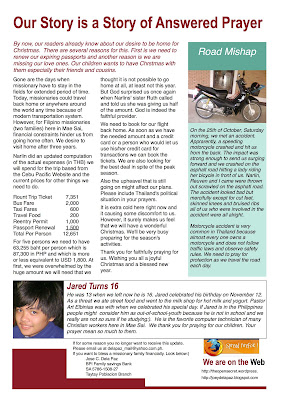Text: Philippians 1:12-26We, people love to complain. It seems natural for us to see negative things in almost every situation we are in. For example, it has been raining all week here in Mae Sai and we complain about it, we couldn’t help it. But when the sun shines, we also complain of humidity.
Have you heard the story about a man who looked at his house through critical eyes, and every place he looked it seemed that he always found something wrong. So he just decided to sell out and move somewhere else.
So he asked an realtor to help him sell the house. The agent came and they agreed to put out an ad about selling the house. But before the ads were sent out, he asked the owner to read it for editing.
The ad spoke of a good location, a well-maintained house, good grass yards, tall trees, a beautiful pond, good location and a great neighborhood. The man listened carefully, and then said, "Read that to me again, slowly." So the realtor read it to him again. Finally, the man responded, "Don’t put that ad in the paper. I’ve always wanted a place like that. I think I’ll stay right where I am."
I always believe that if we all just exert more effort, we can always find positive things in every situation even in the tragic ones.
In his letter to the Philippians, the Apostle Paul adopted this kind of attitude (which is obviously not so with his other letters). The Apostle gives us some great advice in Philippians 4:8. Here is what he says:
"Finally, brothers, whatever is true, whatever is noble, whatever is right, whatever is pure, whatever is lovely, whatever is admirable - if anything is excellent or praiseworthy - think about such things."
Now we all need to commit that verse to memory, because what so many of us do is the exact opposite - dwelling on negative, things that are untrue and wrong and impure. People focus so much on the negative that the media seldom bothers to feature positive news items because people just won’t listen to it.
We can break this pattern and we can start doing that today. Let us look at the Apostle Paul as he focuses on the positive.
In Philippians 1:12-26, Paul does mention some very negative things that are going on in his life - unpleasant circumstances, unreasonable people, and his uncertain future. But Paul goes on to show that God was able to use those negative things in a very positive way.
God Uses Unpleasant Circumstances to Advance the GospelA. Paul begins by talking about unpleasant circumstances. In vs. 12 he says, "Now I want you to know, brothers, that what has happened to me has really served to advance the gospel."
We think we have troubles, don’t we? But how does your list compare to that of the apostle Paul? How many times have you been shipwrecked? How many times have you been beaten near unto death? Or how many times have you been arrested and imprisoned and chained up 24 hours a day?
Yet Paul says, "I look at all these things, and I see that they have served to advance the gospel."
Now the word translated "advance" here has an interesting history. It originally was used of "wood-cutters who go before an army, clearing a way through the underbrush so that the army can march forward unimpeded."
Paul is saying, "All these things that have happened to me have resulted in clearing the way so that the gospel might be preached more effectively."
The imprisonment was positively crucial because the gospel was able to penetrate the ranks of the Roman military even the royal house.
These were the positive development that under normal circumstances would have been closed to the gospel.
In vs. 13, he says, "As a result, it has become clear throughout the whole palace guard and to everyone else that I am in chains for Christ."
Now here is the situation. For 24 hours a day Paul is chained to Roman soldiers, each serving a 6-hour shift. So every 6 hours a new soldier comes in and chains himself to Paul. The soldier was doing his duty, making sure the prisoner wasn’t going to escape.
But Paul saw this as a wonderful opportunity to tell the soldier about Jesus. There was no way that the soldier could escape. And it worked, for in the closing chapter of this letter, vs. 22, Paul writes, "All the saints send you greetings, especially those who belong to Caesar’s household."
Now that tells me that some of these soldiers became Christians, and the gospel made its way even into the pagan household of Caesar - all because Paul was in prison.
There was a second positive result. In vs. 14 he says, "Because of my chains, most of the brothers in the Lord have been encouraged to speak the word of God more courageously and fearlessly."
Paul is saying, "Because of my hardships, because of the things that have happened to me, other Christians have been encouraged. They have seen how God has protected me through difficult situations, and encouraged me, and given me strength beyond my own power."
"Now they’re facing difficult circumstances, too. But because of what they have seen, they’re convinced that God will take care of them, also."
You see, God can take the most negative things that happen to us in life, and make them positive, if we’ll just focus on the positive that is there.
So what are the unpleasant circumstance you have this morning? Are you chained to declining health? Are chained to a very difficult job, and you can’t make ends meet? Are you chained to a job that has no future? Are you chained to loneliness or grief or despair? Then you need to stop and ask, "How can God use this to advance the gospel?"
God Uses Unreasonable People to Proclaim ChristSecondly, Paul talks about unreasonable people. In vs. 15 he says, "It is true that some preach Christ out of envy and rivalry, but others out of good will." What Paul is saying is this, "There are some people who are envious of me, who see themselves as rivals, competitors in preaching the gospel."
Apparently, those who were preaching from envy and strife were not heretics. But they were jealous of the attention Paul was receiving and they were determined to sow seeds of dissension in order to give him trouble.
The motives of these believers were not good. Those who proclaim Christ whose motivation was selfish ambition implies that they did not preach to honor God or to help Paul but rather to gain applause and followers for themselves. They were not acting in pure motives.
Paul was convinced that these preachers actually desired to cause him additional problems while he was in prison.
What difference does it make? Paul asked. In essence he was saying, their motives are between them and God. Whether the preaching was done for false motives or pure, whether for show or for the sake of what was right, Paul was genuinely pleased that the gospel was being spread.
Now vs. 18 is one of the most incredible verses in the Bible. Paul says, "But what does it matter? The important thing is that in every way, whether from false motives or true, Christ is preached. And because of this I rejoice."
Now, only if many Christians could take Paul’s attitude the body of Christ would really look good and attractive to the unbelievers. Paul could have fought back and said something nasty things to these people who were opposing him but he did not.
It is sad that many Christians think that their main ministry is to criticize other individuals or ministries just because their methods and focus are different from them. Just like the Apostle Paul we should rejoice that we are all together, united in our main reason to be here and that is to proclaim the gospel of our Lord and God Jesus Christ.
Let us make our fellow Christians look good. Let us make the body of Christ look good. Let us pray for each other, let us pray for our fellow missionaries, let us help one another to proclaim the gospel... because it is our great joy whether in pretense or in truth, that Christ is being proclaimed. Amen!
God Uses Uncertainty to Exalt Christ*
Finally, Paul mentions his uncertain future. In vs. 19 he says, "I know that through your prayers and the help given by the Spirit of Jesus Christ, what has happened to me will turn out for my deliverance."
Paul is facing trial in Rome. If he is found innocent, he’ll be freed to preach some more. If he’s found guilty, he’ll be executed. He knew he was either going to live, or he was going to die, depending upon the results of the trial.
So he writes in vs. 20: "I eagerly expect and hope that I will in no way be ashamed, but will have sufficient courage so that now as always Christ will be exalted in my body, whether by life or by death."
Here is what he is saying: "My concern is, when I stand before a pagan judge in a pagan court, that I won’t do or say anything to embarrass Christ Jesus, my Lord. My only concern is that I will have enough courage to stand up in their midst and by what I say and do that Jesus Christ will be exalted. Whether I die or whether I live doesn’t matter. All I want to do is exalt Jesus."
Vs. 21 is a very familiar verse. You probably have memorized it at one time or another. Paul says, "For to me, to live is Christ and to die is gain."
If you were going to write that verse, and truthfully describe your feelings, what would you say? "For me to live is money, and to die is to leave it behind." "For me to live is family, and to die is leave them alone." "For me to live is pleasure, and to die is to miss all the fun." "For me to live is fame, and to die is to be quickly forgotten." "For me to live is power and influence, and to die is to become insignificant."
The Living Bible paraphrases it this way: "To me, living means opportunity for Christ, and dying, that’s even better!"
In vs’s 22-24 Paul says, "If I am to go on living in the body, this will mean fruitful labor for me. Yet what shall I choose? I do not know! I am torn between the two: I desire to depart and be with Christ, which is better by far;"
Kenneth Dodge tells about an 8-year-old boy named Frank. Frank had a date with his father to go fishing on Saturday. They were going to fish the whole day. On Friday night he had everything laid out. He was ready to go.
But on Saturday morning he awoke to discover that it was raining cats and dogs, and they couldn’t go fishing. So 8-year-old Frank grumbled and griped and complained all morning long. He kicked the furniture, the dog, the cat. Nothing was right. "Why does it have to rain today?"
His father tried to explain to him that the farmers needed the rain. But that didn’t satisfy Frank. "Why does it have to rain today?" he said. About noon the clouds broke and the sun came out. His dad said, "Well, we can’t go fishing all day, but at least we can fish this afternoon. Let’s go." So they jumped into the truck, went to the lake and fished all afternoon, and caught more fish than they had ever caught before. The baskets were full, and they had the time of their lives.
They came home, and mom cooked some of the fish for supper. As they were sitting down to eat, Frank’s dad looked at him and asked, "Would you ask the blessing?" Eight-year-old Frank prayed this prayer: "God, if I sounded a little grumpy earlier today, it was because I couldn’t see far enough ahead."
That’s the problem, isn’t it? We’re so caught up in the circumstances and people and things that surround us, that we just can’t see far enough ahead.
But when you take time to look, people, you’ll begin to focus more and more on the positive, because in Christ we have a wonderful future. It may seem uncertain right now, but we have a certain destiny in God. And one day we’re going to see Him face to face and be with Him for all eternity.
*The last point and illustrations are adapted from Melvin Newland's sermon


 Reading Duvall & Hays'
Reading Duvall & Hays' 















.jpg)

